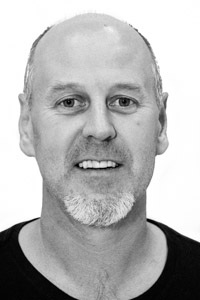 Middlebury, VT — John Illig, the men’s and women’s squash coach at Middlebury College, died this weekend. He was 50 years old.
Middlebury, VT — John Illig, the men’s and women’s squash coach at Middlebury College, died this weekend. He was 50 years old.
While in college, Illig played varsity squash and tennis. After starting his collegiate career at Trinity College, Illig transferred to the University of Rochester, where he played for legendary coach and Men’s College Squash Association Lifetime Achievement Award winner Peter Lyman. He graduated from Rochester in 1986 with a degree in English Literature.
Illig began his coaching career at Colby College. During his five seasons leading the Mules, he amassed a 143-141 record. In 1995, he helped the Colby men win the Barnaby Award, which is given annually to the men’s team showing the most improvement from the previous season. Also in 1995, Illig coached Kate LaVigne to the Wetzel Award, which is presented to a senior woman who began playing squash in college and has progressed to a high level of skill, demonstrates sound understanding of the game, and exhibits good sportsmanship and a positive demeanor on the court.

In 1996, Illig transitioned to Bates College. From 1996 to 2007, he led the Bobcat women to a 150-87 mark. He continues to hold the coaching career records for wins, losses, and tenure for the Bates women. In 2000, Bates senior Emily Soisson was presented with the Wetzel Award. That same season, Illig and the Bates team won the Chaffee Award, an award presented to a coach whose team has demonstrated the qualities of sportsmanship, teamwork, character, and improvement. Illig also coached Aisha Shah to a Honorable mention All-American status in 2001 and a Second Team All-American position in 2002. During his 11 seasons, the Bobcats won the Kurtz Cup (B Division title) in 2004, 2005, and 2006.
In 2001, Illig added the men’s team to his coaching duties at Bates. He led the Bobcat men for six seasons and to a 93-43 record. In 2003, the Bates men were presented with the Sloane Award, which is given annually for team sportsmanship. During his final three season at Bates, 2004-05, 2005-06, and 2006-07, he coached Ricky Wiesskopf to Second Team All-American honors.
In the fall of 2007, Illig began his coaching tenure at Middlebury College. He took over a well-established women’s varsity program and became the first varsity coach for the newly established men’s program. In his seven seasons leading the women’s team, he had a 108-55 record. He led the Panthers to their first 20-win season (2009-10). In 2009, he was named the New England Small College Athletic Conference (NESCAC) women’s squash coach of the year. In 2012, the Middlebury women were presented with the WCSA’s Most Improved Team Award.
With the Middlebury men, Illig had a 102-66 record. As the sole varsity coach in program history, he holds all of Middlebury’s coaching records. By his third season at the helm, Illig guided Middlebury to their first 20-win season. He led the Panthers to the Summers Cup (C Division) title in 2009, 2010, 2013, and 2014. In 2009 and 2011, his is Middlebury squads were presented with the Sloane Award. Last season marked the first year for Middlebury in their new nine-court squash complex.
Illig was involved in both the Men’s and Women’s College Squash Association. He served as president of the WCSA from 2001 – 2003. During that time, he worked to create equality between the MCSA and WCSA. The current team championship format, which alternates weekends each year, was put in place during Illig’s presidency. In addition, the names of the women’s team championship division were created. In 2002, the National Intercollegiate Squash Racquets Association and the Women’s Intercollegiate Squash Association partnered to form the College Squash Association.
Illig succeeded Trinity coach Paul Assaiante as the president of the Men’s College Squash Association in 2013. Illig worked to bring the MCSA and WCSA closer together during his season in office. Along with George Washington coach and WCSA President Wendy Lawrence, he led CSA Strategic Review Sessions in June of 2013 and 2014, which helped lay the groundwork for the future of the CSA. He also reinvigorated the MCSA leadership structure, bringing a new generation of coaches into Executive Committee positions.
An avid outdoorsman, Illig had a passion for hiking. Each pre-season, he took his teams on an overnight hike in the Adirondack Mountains. Personally, his many hiking adventures included the Appalachian Trail, the Pacific Crest Trail, and the Continental Divide Trail. He used these experiences to author multiple books, including Man in the Middle, Pacific Dream, and Trail Ways, Path Wise. He also participated in strenuous endurance races, such as marathons, triathlons and ultra-marathons.
Illig is survived by his wife Lolly Otis.
In his 23 plus years of college coaching, Illig had a profound impact on countless players, coaches, and fans. He will be missed.
—
Middlebury Mourns Death of Squash Coach John Illig
—
Reflections from CSA Coaches:
If you would like to add your own reflections, please e-mail the CSA.
“Our family is extraordinarily grateful for the expressions of love and respect expressed by his colleagues and friends. John was critically injured after a fall at home, did not suffer, and died with his beloved wife Lolly at his side. His liver, kidneys, and especially his wonderful heart will all be transplanted within the next few hours – so as his last act he will still be helping others. Thank you all for remembering him.” – Karl Illig, John’s brother.
“I write as a coach, a competitor, a colleague and a friend of Johns. I send to you my heart felt sympathy and prayers. How does one make sense of this tragic event and unfathomable loss? Sometimes words are simply not enough and cannot express something of this magnitude. But I felt that I must try because I cared so much for John. The Buddhists suggest that the only thing you can count on in life is impermanence. Perhaps they are right, at least in the physical existence of a person. John loved the game but I know that he cared deeply for each and everyone of you. He tried to stimulate your imaginations, your passions and challenged you to be better both on and off the court. In this regard, I implore you to not let those principles pass with John, but rather let them live on in your actions so that his messages will not only live on but through your efforts you may even ‘pay it forward.’ We as educators simply want to touch a few and be remembered fondly. John was wildly successful in his touching many. Please, please be sure to always remembering him fondly and carry with you his joyous zeal for life. If you do, perhaps John will remain with all of us, forever.” – e-mail to the Middlebury squash program from Paul Assaiante, men’s coach at Trinity College.
“I was so excited to be elected as WCSA President mostly to have the opportunity to work closely with John because I could knew he was such a creative guy and so eager to put all his energy and enthusiasm into moving the CSA forward. He would send me long wonderful stream of consciousness emails filled with his ideas for the CSA..no idea was too small. He was such a smart guy who thought outside the box which help us all look at the old ways very differently. When GW played Middlebury you could just tell how much his players adored and respected him. He showed great sportsmanship and fairness to everyone no matter how tough the match. John was the kind of college coach that you respected and envied for his passion, humor and for how much his players loved playing for him and Middlebury.” – Wendy Lawrence, men’s and women’s coach at George Washington University and the WCSA President.
“I would like to echo Paul Assiante’s sentiments that there are no adequate words to honor John and the legacy he now leaves. It was always clear that the teams he coached truly loved and admired John. What I will choose to take, as time begins to heal the shock of this situation, is John’s giant warm heartedness, zest for life and passion for the people around him. As well as being an inspirational coach he was a wonderfully creative thinker and talented author. That giant cheeky smile that he carried with him, particularly since he met Lolly, is the picture I will hold onto and and am so very grateful for the time we were all lucky enough to spend with John. Deepest sympathies to Lolly, John’s family, all at Middlebury College and beyond.” – Shona Kerr, men’s and women’s coach at Wesleyan University.
“Some random thoughts about John, in no particular order: John marched to a different drummer. He discharged his coaching responsibilities, at least from my outsider view, responsibly, encouraging his athletes to create energy and momentum as teams, but not surrender their capacities to think and act independently and responsibly. He encouraged sportsmanlike conduct, and respect for the viewpoints of others, both among his students and among his friends and colleagues. John was a very philosophical person, and his thoughtful approach to issues comprised an admirable facet of his mentoring of his students. His approach to the environment and health, as well as his drive to finish a project once started served as an example to us. I personally appreciated his always civil communications skills, and his efforts to reach consensus on issues. I will miss John, both for myself and for his contribution to and leadership in college squash.” – Jon Oxman, CSA attorney and WCSA Hall of Fame Member.
“It is impossible to make sense of the tragic death of John Illig, but his legacy and energy will live on as long as there is college squash. Personally, I was fortunate enough to experience John’s essence is many different lights; first as an opposing coach at Colby while I was a student-athlete at Bates, then as a coach, mentor and colleague at Bates and most recently as a friendly adversary at Middlebury. John Illig taught me every step of the way and I am a better person because of it. Professionally, it’s fair to say that the Bates Squash program would not be where it is today without John’s influence and hard work. He laid the foundation for success by taking a chance on and having faith in so many young people who would not otherwise have had the opportunity he afforded them. My heart breaks for the dozens of young people and family members John leaves behind, and we all reminisce with very fond memories of a man who made us all smile and laugh, while also teaching us how to be better and more complete. John was a force of nature and an undeniable personality who lived his life to the fullest and enjoyed every moment. We would all be remiss if we didn’t try to emulate and honor John’s passion in our own lives in some small way. My thoughts and prayers are with his family, the wonderful people at Middlebury College and all those affected by the tragic loss of a legendary spirit.” – Pat Cosquer, men’s and women’s coach at Bates College.
“Very simply, John’s enthusiasm for life was infectious, and his love for his family, friends, and players unwavering. Those fortunate enough to spend time with John (JIllig), found themselves completely absorbed. JIllig was tremendously creative, genuinely smart, a unique and philosophical problem solver, and an endless source of trust and support. JIllig’s primary goal as a coach and mentor was to provide his players with a platform that enabled each of us to flourish as people. He encouraged us to make mistakes, pushed our boundaries, and expanded our horizons. His methods were both subtle and obvious, and very often involved bizarre metaphors – Many come to mind, but in particular JIllig was fond of the relationship between mongoose and staplers. Most importantly, JIllig taught us to believe in a method that was honest, gracious, and extremely fun. He believed so earnestly that a team built around those principles was far more effective than a team of individuals – His win loss ratio will no doubt be lauded, but the indelible mark he has made on every one of us is his greatest victory. He strived to make every player feel important, to make sure that we knew we were part of the sum that made up something much larger than ourselves. John set the standard for coaching, and I will no doubt be learning his lessons for many years to come. I am so incredibly grateful for John’s support and complete trust in my abilities over the years. From the day I arrived on the Bates campus, until as recently as last week, John has always been a primary source of advice. He helped me through many difficult moments in college, and after graduation encouraged me endlessly to pursue my passion for coaching. He was always the first person I called before applying for a job or headed off for an interview. His advice was always honest, genuine, and heartfelt. More recently, I was fortunate enough to spend quite a bit of time talking with JI and I have never heard him sound happier than when he spoke of his life in Vermont. Lolly, the Tram House, and his life at Middlebury College had finally quenched his never ending desire for stability and access to mountains and the outdoors. As I spend the next few weeks and months reflecting on the loss of my coach, mentor and friend, I will take much solace knowing that he was truly happy surrounded by wonderful people. Thank you, John – You have made an incredible mark on our lives, and you will be sorely missed.” – Sean Wilkinson, men’s coach at Princeton University.
“It is with extreme and shock and unhappiness that I read the CSA release this morning of John’s most unfortunate death. I can only say that my memories of John from the 11 years which I knew him and made a distinct effort to schedule his teams each year are ones that light up my eyes and make me smile. From his private team squash club in Lewiston, ME, to his cozy little office at Middlebury he made visiting his schools a real pleasure. His players were always welcoming and they played with a joy for the sport which I love. John had no other agenda other than giving his players the best possible experience over their four years, and to hear Sean W. speak so eloquently of John and that experience is perfect testament to his influence. My sincere condolences to his wife Lolly and all his family and friends.” – John Power, former men’s and women’s coach at Dartmouth College.
“I met John for the very first time when I went waaay up into the northern woods of College Hill in Waterville to set up my office at Colby when John left there to go to Bates. I could feel how smart he was and of course instantly dry and quick and cheeky. So why the move, Johnny? Frankly I think he just couldn’t take the girls! I laugh, remembering the sort of white flag of surrender he had in his voice when he gave me the general monarch notes he had from his stretch at Colby, to try to help me along as I stepped into that job fresh from grad school. But there was a twinkle in his eye about it all! And I knew he was handing me a good thing, that he just hoped I might do a slightly better job of making sense of the girls than he! But I think that was John just starting to make sense of his own life, and being in charge of a giant bunch of young women will tend to push all those buttons of “what the heck?” We had a lot to do with each other as new colleagues and neighboring coaches. Lots of note-comparing and trading stories. Lotsa hanging out together and with other coaches after weekend matchplay, in funky ramada bar lounges wherever our teams were staying up and down the coast. And then he invited me to go hiking…….” – Erica (Ricky) Silbersher, former women’s tennis and squash at Colby and former assistant coach of men’s and women’s squash coach at Dartmouth College.
“I was stunned to see the sad news of John’s death. I still find it unbelievable that someone so vigorous and full of life at such a young age could so suddenly be taken. I first met John at a coaches conference many years ago. Since I was in charge of the food John politely asked me if he could have meals without meat as he was a vegetarian. When I asked him if this was a philosophical commitment, he told me he had seen a documentary about the treatment of animals in the food chain and vowed never to eat meat again. Up to that point I had only met people who would have winced, not make the commitment John did with all the difficulties and inconveniences such a commitment would entail. I was immediately impressed. Later when I learned about John’s hiking exploits I eagerly looked forward to seeing him at meets where I could talk with someone who shared my enthusiasm. He was my hiking hero and the source of many tips and suggestions. I was thrilled and flattered when he sent me his manuscripts for comment. So once when I was hiking in Wyoming there was a sense of deja vue as I had read about John’s travel on the same route. I excitedly emailed him from the trail and he emailed me back telling me not to miss the homemade pies in the Cowboy Café in Dubois, Wyoming. Wow, you can’t get that kind tip from trail guidebooks. And he was spot on as they were delicious. Now I feel a deep loss, even though my hiking days are over, that if I were ever to run into John we could talk again about where we had been and what were good places to go. But I take some solace that he is where we all will wind up, checking out the trails, and will have it all figured out before I get there. My sincerest condolences to his family.” – Bill McNally, retired men’s and women’s squash coach at Connecticut College.
“For John. It was with terrible sadness that I learned of John’s death. There really are no words. God bless John and his family and friends.” – Jackie Bagwell, women’s tennis coach and former women’s squash coach at Amherst College.
“As a Colby program we would like to express our deepest condolences with the passing of John Illig. It is impossible to know what you are going through but we send you our most heart-felt sympathy. Many of us knew John through the recruiting process and match play, and he demonstrated the truest qualities of a great coach and sportsman. He was always respectful and fair; matches, no mater how tough, were a fun event and featured some of the best matches played. His huge smile and witty banter were infectious to any who were lucky to come into contact with him. On many of our own recruiting trips to Middlebury, he went out of his way to accommodate and make us feel comfortable. In such a nerve-wracking time in our life, he made us feel excited about the possibility of playing squash. He cracked jokes with parents in his office while casually lounging with his feet up. He spoke about the amazing ways the team bonded with each other and how the program was truly a family, his family. We’re so thankful for his kind words throughout the college process and he would take the time to catch up at matches, teasing us he was nice enough to talk even though we had chosen another NESCAC school. So many of us on this team had similarly wonderful experiences with John and he will have a lasting impact on those who got to know him. This program knows how special a person we have lost but cannot put ourselves in your place. We want to extend our deepest sympathies to you with the passing of such an incredible spirit and know that he will be remembered for all the people he inspired in his lifetime.” – Sakhi Khan, men’s and women’s squash coach at Colby College.
“He was such a great friend!” – Tomas Fortson, men’s and women’s squash coach at Bowdoin College.
“So saddened to hear of John’s passing. I was not fortunate enough to spend as much time with John as many of you, but in only a few interactions he made quite an impression on me. As a player/coach on a nascent Vanderbilt team, I was struggling to find matches for us for a scheduled trip to the east coast. John offered to drive his Middlebury teams out of the way during a long Sunday trip home to play us. When our hosts would not make their courts available for an additional Vandy-Middlebury match, John wrote an impassioned email to that school’s Athletic Director, emphasizing the camaraderie that is a part of College Squash and the support that should be given to all teams, and that he would not schedule future matches against that school if they were unable to support this match. John’s going to bat for us has stuck with me to this day. His insistence to do what he felt was right, despite having zero benefit for him and his team, remains a powerful memory. I only hope I can exhibit a sliver of his character, in squash and the rest of my life, going forward. I feel lucky to have known John, and my thoughts are with his family, the Middlebury community, and all those who knew him.” – Max Franklin, former men’s and women’s coach at Vanderbilt University.
“On behalf of the Virginia squash teams, I wanted to pass along condolences on the passing of Coach Illig. I didn’t know John as well as some but I did have occasion to play against his teams many teams while I was at Bowdoin. And all of my impressions of him were distinctly positive. He always struck me as a gentleman and the sort of person who makes squash the special sport that it is. In my recollections, he is never without a smile. He always had kind words for me after my matches against his players–and considering what a twerp I could be in those days (some would argue these days too), that’s saying something. I hate to hear anyone from Bowdoin speak ill of Bates (really speak ill, not just a little gentle joking around.) Because, in the end, what makes a great rivalry is how much the two sides have in common. Few coaches demonstrated this truth better than John. John was one of the coaches that I always thought I could look forward to getting to know in future seasons. His death is a reminder that we should never wait to get closer to the good people who are around us. I wish that I had done so earlier. And I hope I will not fail to abide this last lesson from Coach Illig in the future. If there is anything we can do to help ensure that John’s legacy echoes out in the squash world and beyond, please don’t hesitate to be in touch.” – Grant White, assistant men’s and women’s coach at the University of Virginia.





